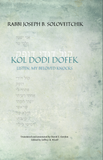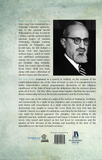NEW 2023 reprint!
Kol Dodi Dofek:
Listen - My Beloved Knocks
Rabbi Joseph B. Soloveitchik
Translated and Annotated by David Z. Gordon
A Publication of Yeshiva University
Rabbi Soloveitchik's unique and widely influential approach to theodicy is that in the face of catastrophe and misfortune, we cannot ask why, since that question is unanswerable. Instead, we must ask how we can grow and individuals and as a community. It is not the why? that is important, but the what?
Rav Soloveitchik grapples with the enormity of the Shoah and the miracle of the founding of the State of Israel and what our responses should be to both. He contrasts a life of fate, where one is an object, with the life of destiny, where one is the subject and acts. "We ask not about the reason for evil and its purpose, but rather about its rectification and uplifting. How should a person react in a time of distress? What should a person do so as not to rot in his affliction?" We can not try to explain the irrational hatred that prevailed in the world between 1935 and 1945, nor should we assign blame within. We must focus instead on what we can learn from that fearsome time. Rav Soloveitchik does not concentrate on theodicy but rather on going forward. He shows that the Covenant of Fate during our suffering in Egypt is completed in the Covenant of Destiny at Sinai. "Destiny joined fate" to form a unit. "A Jew who participates in the suffering of his nation and its fate, but does not join in its destiny, which is expressed in a life of Torah and mitzvot, destroys the essence of Judaism and injures his own uniqueness. By the same token, a Jew who is observant but does not feel the hurt of the nation, and who attempts to distance himself from Jewish fate, desecrates his Jewishness" (p.73).
He uses the language of the Song of Songs, Shir HaShirim, to describe the relationship between the Jewish people and our "Beloved," Hashem. The response of the nation to "kol dodi dofek," "My Beloved is knocking" (5.2) is tragic hesitation, not arising to answer the door, excuses: "I have removed my cloak, how shall I put it on again? I have washed my feet, how shall I soil them?" (5.3). By the time the nation awakens from its sloth, "My Beloved had turned away, and was gone" (5.6).
Rav Soloveitchik gives examples of Hashem's "knocking at our door": the United Nations resolution recognizing Israel; the miraculous victory on the battlefield when the Arab nations united against Israel and ended up ceding more land to the Jewish nation than had originally been planned; the theological implications of a Jewish government in Israel; Israel as a counterforce to assimilation and Jewish self-hatred, and as a factor in maintaining Jewish identity among the unaffiliated; Israel putting the power of self-defense in Jewish hands; Israel as a refuge for Jews"how many lives would have been saved if we had possessed a country of our own in 1939. He shows that we have not answered properly, and how we should respond.
His essay demonstrates the need for sophistication in many fields of knowledge in order to appreciate the workings of Hashem. For example, he analyzes how problematic the events of 1948 were for Christian theology. Christian belief had been predicated on a "new" covenant superseding the "old" one between God and the Jews, a "new" testament that "fulfilled" the meaning of the "old" one (that is why Jews say the "Hebrew Bible," not the "Old Testament"). Christians could handle the Land of Israel being desolate; they believed that promises about Zion and Jerusalem should be interpreted as foreshadowing Christianity and the Christian Church. But the allegorical reading no longer applied when Zion and Jerusalem were flourishing in Jewish hands.
Rav Soloveitchik's essay also demonstrates how Torah scholarship reveals new insights that are applicable, years after they were written, to today's challenges. Two examples speak to today's headlines:
"The State of Israel is as isolated today as the community of Israel has been during the thousands of years of its existence. And perhaps the isolation of the State is more pronounced than in the past because it is so clearly revealed in the international arena" (p.82). Rav Soloveitchik gives the proof-text: "They plot with craft against Your people, and take counsel against Your treasured ones. They have said: Come, and let us cut them off from being a nation; that the name of Israel may be no more in remembrance'" (Psalm 83.4-5). Hamas is nasty, but not original.
Again, speaking fifty years ago to issues that preoccupy us today, Rav Soloveitchik notes that secular Zionists sin against "the covenant of a sacred community and people that finds expression in the shared destiny of a sanctified life" (p.84). We must rise "to the elevated station of a moral, religious community" from which we can draw "strength and sustenance, creative power and a renewed joy in an existence that is free and rejuvenated" (p.85). Many of the social problems that plague Israeli society, especially the malaise of the young people, come from our missing the opportunity to create the "moral, religious community."
The essay originated in 1956 as an address in Yiddish by Rav Joseph B. Soloveitchik to the Religious Zionists of America to mark the eighth anniversary of Israel's independence; after re-writing it in Hebrew, he published it in 1961. David Z. Gordon translated it into English and annotated it, Professor Jeffrey R. Woolf of Bar Ilan edited the translationTheir new version conveys the complexity, depth and poetry of Rav Soloveitchik's expression in clear, readable prose.
Rabbi Joseph B. Soloveitchik (1903-1993), was recognized as one of the leading Talmudic authorities of his generation and the acknowledged spiritual leader of Modern Orthodoxy. Though working primarily in Talmudics, he did publish several essays of a broader nature, including Halakhic Man and The Lonely Man of Faith.




